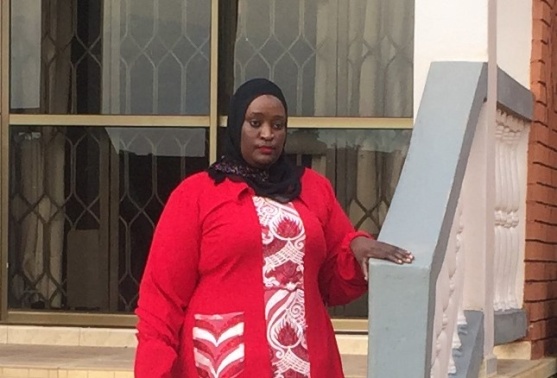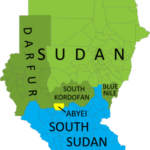The story of the late Nuhu Muzaata’s widow
By Wesibade Halima
Kuruthum Nabunya Muzaata says that losing her husband is one of the worst nightmares she has encountered in life.
She was only 30 years old when she was met with the sudden loss of her husband, Sheik Nuhu Muzaata in 2020 due to the coronavirus. Soon after her husband’s death, she was confronted with a myriad of misfortunes.
“First, my husband’s relatives didn’t believe that he died of #Covid-19,” she said, “just like the narratives I had heard before in the community, they accused me of having a hand in his death.”
Nabunya narrates that these accusations spiked a lot of chaos in her life, to a point that she and her child were chased away by her husband’s relatives from her home.

“I had seen this happening in many homes but I never understood their pain until it happened to me. It was very painful to see my son go through such trauma,” she said.
Narrating how she struggled to be back on her feet after the loss of her husband and property, Nabunya expressed that she took up the initiative of promoting a feeling of togetherness among widows.
“Losing a husband isn’t easy. We lack access to emotional and psychological help and constantly fall into hands of predators who take advantage of our vulnerability,” she said, “I thought about my experience of losing my husband and decided to fill a void in people’s lives.”
During the Ramadan of 2021, Nabunya and her family felt compelled to donate food to the widows within her home region of Bwaise and Kawempe.
“I could see delight in the hearts of the widows, this simple food donation scenario pushed me into starting the Nuhu Muzaata foundation that is in memory of my late husband and caters for the needs of widows and orphans,” she said.
Being a teacher by profession who holds a doctorate in Education and management, Nabunya also constructed a private school that generates income, which is essential in providing scholarships to over one hundred underprivileged children primarily from the slums of Kawempe and Bwaise to date.
Explaining that she attends to the widows through referrals, Nabunya notes that she caters for about 100 widows and orphans, who are very appreciative.
“Widows and orphans battle with inequality and under representation everywhere. We have been excluded in many socio-economic activities,” said Nabunya, “Through our togetherness in the foundation, a little glimmer of hope is seen and I hope we can come up with a long term solution that cares for the widows.” Nabunya however thinks that men should empower their wives such that in case the husband dies then the family is able to go on without any setbacks.
Janet Namutebi is a beneficiary of Nabunya’s charity services. She notes that the foundation has been very instrumental in supporting her as a widow who is HIV positive. “I got to know about the Foundation at the hospital where I get my Antiretrovirals from. My fellow women introduced me to this foundation and requested that I be part of it,” she said.

“I did not think twice about joining the foundation because of my struggles to get school fees and food for my children.”
According to Namutebi, ever since she joined Nuhu Muzaata foundation, she has been receiving food donations twice a month.
She said, “this has helped me a lot. Before I could even fail to take my treatment due to a lack of food.”
13-year-old Edonyu Jeremiah from Bukasa studies at Anwar primary school on full bursary. Ebonyu lost his parents in a car accident and he narrated that life without his parents is very difficult because people consider him a burden. When I see other children with their parents I put my hands up and pray to God to protect them,” Edonyu said.

“I used to fear going to school due to lack of school fees, but I have been greatly favored by the foundation and now, I dream of being a pilot,” he said.
Besides giving bursaries in her school Nabunya also sources half bursaries for girls in high school using her connections in the education sector.
A glimpse into culture
Augustin Kizito Mutumba, the Kobe clan leader in Buganda kingdom stated that a lot of things have gone off the rails as far as humanity and personality are concerned; people forging titles deeds on people’s land, a vice which has not spared the widows and orphans.
“Opportunists take advantage of the vacuum left by the deceased, they hide behind culture to grab property,” he said.

And when asked about the factors fueling property grabbing, Mutumba responded, “all these things happen due to absence of a will. People fear drafting them but every household head male or female must have one as it is beneficial in preventing family feuds and tarnishing the image of a deceased person, most importantly it guides distribution of estates.”
Reports by the International Justice Mission show that for many women in Uganda property grabbing is a common experience following the loss of a husband, where nearly 40% of widows faced an attempt or experienced property grabbing. Then a poor woman is left to contend against the challenges of eking out a living in harsh conditions also with the threat of abuse against her children if she attempts to stand up for her rights.
Kuruthum says that you do not need to have a lot of fortune to help people. “Even with the little you have, you can put a smile on someone’s face, for those chasing women out of their homes please try to wear the shoes of a widow and orphan because tomorrow it could be you my you dying and your wife might surfer the same.”

With hope of changing society’s perspective of widows and orphans Nabunya in her means continues to empower them through education.
This publication was produced with the financial support of the European Union. Its contents are the sole responsibility of Wesibade Halima and do not necessarily reflect the views of the European Union.








